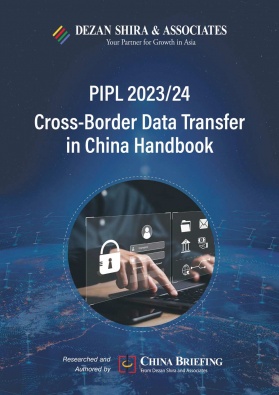China Issues 24 New Measures to Attract Foreign Investment
China’s legislature has released a new plan to attract foreign investment after a year of falling foreign direct investment inflows. The plan, the latest in a series of efforts to boost foreign capital in China, proposes measures to improve the business environment, ease administrative burdens, expand market access in key industries, and even the playing field for foreign companies. We outline the policy proposals that could benefit foreign companies in the coming years.
The State Council has released a 24-point plan to boost foreign capital in China. The plan, titled the Action Plan to Solidly Promote High-Level Opening Up and Make Greater Efforts to Attract and Utilize Foreign Investment (the “Action Plan”), outlines various measures to attract foreign investment, including expanding market access in key industries, ensuring equal participation of foreign companies in government bidding, and facilitating cross-border data flows.
China has been striving to encourage and support foreign investment in recent years. Efforts ramped up in 2023 when levels of foreign direct investment (FDI) inflows to China fell by 8 percent year-on-year. In July 2023, the State Council issued a similar set of measures that aimed to improve the business environment for foreign companies, with suggestions including measures to strengthen intellectual property rights and ease regulations on cross-border data flows.
Boosting foreign investment was also mentioned as an important task in the 2024 Government Work Report (GWR) released during the Two Sessions. Among other directives, the GWR called for removing market access restrictions in manufacturing fields and relaxing market access for telecommunications, medical, and other service industries.
In this article, we outline some of the key measures proposed by the State Council to attract foreign investment in 2024.
Expanding market access and liberalizing foreign investment
One of the main measures in the Action Plan is to expand market access for foreign companies by “reasonably reducing” the negative list for foreign investment access. This document lists the industries and sectors that foreign investors are prohibited from participating in, and thus by shortening it, more sectors will become accessible to foreign investors. It was last updated at the end of 2021.
The Action Plan reiterates the directives mentioned in the GWR, stating that the government remove restrictions on foreign investment in the manufacturing sector, and continue to promote the opening up of telecommunications, medical, and other fields.
Meanwhile, the Action Plan also calls for carrying out pilot projects to relax foreign investment access in the field of scientific and technological innovation. This will be carried out in pilot free trade zones (FTZ) such as Beijing, Shanghai, and Guangdong, which will be permitted to select a number of qualified foreign-invested enterprises (FIEs) to expand access in areas such as the development and application of genetic diagnosis and treatment technologies.
Other proposed measures to expand market access include (but are not limited to):
- Expanding the access of foreign financial institutions in the banking and insurance field.
- Deepening the opening up of commercial pension insurance, health insurance, and other industries, and supporting qualified overseas professional insurance institutions to invest in, establish, or participate in insurance institutions in China.
- Expand the business scope of foreign financial institutions participating in the domestic bond market.
- Encouraging foreign investors to invest in the establishment of private equity funds and carry out various investment activities.
Increasing “policy intensity” to attract foreign investment
In addition to shortening the foreign investment negative list, the Action Plan also calls for expanding the Catalogue of Industries Encouraged for Foreign Investment (the “encouraged catalogue”) and the list of major and key foreign investment projects.
The encouraged catalogue lists the industries in which foreign investment is welcomed and treated with favorable policies in China. The encouraged catalogue is divided into two sub-catalogues, one covering the entire country (the “national catalogue”) and one covering the central, western, and northeastern regions (the “regional catalogue”). This catalogue was last updated at the end of 2022.
According to the Action Plan, the expansion of the national catalogue will focus on increasing support for areas such as advanced manufacturing, high-tech, energy conservation, and environmental protection, while the regional catalogue will increase support for areas such as basic manufacturing, applicable technology, and consumption.
In addition to the encouraged catalogue, the Action Plan also calls for foreign investment projects in the fields of integrated circuits, biomedicine, and high-end equipment to be included in the list of major and key foreign investment projects, which will thus be allowed to enjoy corresponding support policies.
Another mechanism to support FIEs and foreign-invested projects is to implement supportive tax policies. These include:
- A tariff exemption for imported self-use equipment for projects invested by FIE-reinvested enterprises within the territory of China that meet the conditions of the encouraged catalogue.
- Implementing preferential tax policies for foreign investors investing in China’s bond market and other financial markets.
The Action Plan also calls for increasing financial support for FIEs, with financial institutions encouraged to provide high-quality financial services and financing support to qualified FIEs. Qualified FIEs will also be supported to issue RMB bonds domestically for financing and use for domestic investment projects.
Other proposed measures include:
- Promoting the implementation of policies to facilitate foreign exchange management of cross-border trade and investment and continuing to improve the convenience of foreign exchange business for FIEs.
- Strengthening energy utilization guarantees by improving the regulation of the total amount and intensity of energy consumption, focusing on controlling fossil fuel consumption in alignment with China’s new mechanism for decarbonization.
- Accelerating the promotion of green certificate transactions and cross-provincial green electricity transactions to better meet the green electricity needs of FIEs.
- Supporting the central, western, and northeastern regions in undertaking industrial transfers and encouraging these regions to leverage their local comparative advantages and formulate policies and measures based on local conditions to reduce the costs of land, energy, labor, logistics, and other costs for manufacturing enterprises.
Ensuring fair competition and providing good services to FIEs
Looking to tackle one of the core complaints from FIEs operating in China, the Action Plan calls for “cleaning up behaviors and policies that violate fair competition”. Specifically, it calls for promptly handling discriminatory behavior that has been reported against FIEs, including in areas such as government procurement, bidding, qualification licensing, standard setting, and subsidy enjoyment. The Action Plan calls for rectifying these issues “within a time limit”.
The Action Plan also seeks to improve the bidding system through a variety of mechanisms. This includes accelerating the revision of the Tendering and Bidding Law of the People’s Republic of China, although it does not specify how the law may be amended.
The government will also seek to remove unreasonable restrictions that prevent enterprises of all types of ownership from participating in tendering and bidding on an equal basis and will formulate rules for fair competition review in the field of tendering and bidding.
FIEs will also be encouraged and supported to participate in standardization technical committees or relevant standardization organizations in fields such as advanced manufacturing, engineering materials, and information communications to participate in the formulation and revision of standards.
Finally, the Action Plan calls for strengthening services for FIEs by making good use of platforms such as the FIE roundtable to deepen regular exchanges with FIE, foreign chambers of commerce, and international organizations. It also seeks to improve administrative procedures by enhancing cross-departmental coordination working mechanisms for complaints from FIEs and continuing to promote departmental data sharing. This will mean that FIEs do not need to repeatedly supply information that can be obtained from other departments.
Promote cooperation on innovation between domestic companies and FIEs
Facilitating cross-border data flows
The Action Plan outlines a series of measures to improve cross-border collaboration between Chinese and foreign companies. One of the most significant is supporting data flows between FIEs and their overseas headquarters. Under China’s Personal Information Protection Law (PIPL), companies are required to undergo one of three mechanisms to export personal information overseas. These include undergoing an export security assessment, undergoing personal information protection certification by a third-party agency, or signing a standard contract with the overseas recipient of the personal information. These procedures can be cumbersome and a hindrance to the normal flow of data of companies in China with their overseas offices and partners.
The Action Plan proposes standardizing cross-border data security management, organizing and carrying out data export security assessments, and standardizing the filing of standard contracts for the export of personal information, among other related work.
The Chinese government has been considering ways to facilitate cross-border data flows to make operations easier for foreign companies. In September 2023, the Cybersecurity Administration of China (CAC) released a set of draft rules that proposes to ease rules on the export of personal information and “important” data overseas.
Meanwhile, in December 2023, the CAC released a set of guidelines for companies in the Guangdong-Hong Kong-Macao Greater Bay Area (GBA) to sign a standard contract to engage in cross-border personal information transfer between the mainland portion of the GBA and Hong Kong, making it easier for companies located in one of the nine mainland cities of the GBA to transfer personal information to Hong Kong.
The Action Plan expands upon these efforts, proposing to develop cross-border data transfer standards for the GBA. The standards would rely on major cooperation platforms such as the Hengqin Guangdong-Macao In-Depth Cooperation Zone and the Qianhai Shenzhen-Hong Kong Modern Service Industry Cooperation Zone to establish a cross-border data flow mechanism for Hong Kong and Macao enterprises. The Action Plan also calls for exploring the establishment of a “whitelist” system for cross-border data flows, and steadily promoting the convenient flow of data within the GBA.
Another important point in the Action Plan is the call for defining “important data”. Under the PIPL and other related regulations, companies handling important data are subject to more stringent rules on protection and cross-border transfer (as described above). However, the scope of what is considered important data has not been clearly defined, making it difficult for companies to navigate the regulations.
Improving visa conditions for foreign workers of FIEs
In addition to facilitating data flows, the Action Plan proposes further efforts to facilitate the exchange of international business personnel by making it easier for foreign businessmen to apply for visas to China. China already took steps toward achieving this in August 2023. An important announcement in the Action Plan is the extension of the visas for accompanying spouses and minor children of managers and technical personnel of FIEs to two years, up from 180 days.
The Action Plan also calls for optimizing the management of foreigners’ work and residence permits in China by improving the application process for foreigners’ work permits and work-type residence permits in China and adopting the method of “one-stop acceptance and simultaneous approval” to create a faster and more efficient approval mechanism.
About Us
China Briefing is one of five regional Asia Briefing publications, supported by Dezan Shira & Associates. For a complimentary subscription to China Briefing’s content products, please click here.
Dezan Shira & Associates assists foreign investors into China and has done so since 1992 through offices in Beijing, Tianjin, Dalian, Qingdao, Shanghai, Hangzhou, Ningbo, Suzhou, Guangzhou, Dongguan, Haikou, Zhongshan, Shenzhen, and Hong Kong. We also have offices in Vietnam, Indonesia, Singapore, United States, Germany, Italy, India, and Dubai (UAE) and partner firms assisting foreign investors in The Philippines, Malaysia, Thailand, Bangladesh, and Australia. For assistance in China, please contact the firm at china@dezshira.com or visit our website at www.dezshira.com.
- Previous Article How to Conduct a Personal Information Protection Impact Assessment in China
- Next Article China’s January – February 2024 Economic Roundup









